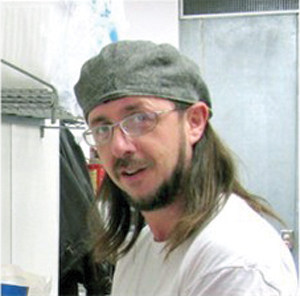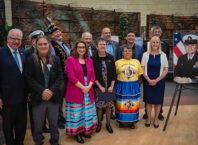On April 29, five American Indian students walked out of their Ojibwe language class at Robbinsdale Cooper High School.
“We were tired of the class”, said Ashlee Lemon (Ojibwe) , an 11th grade honor student, “We were tired that our substitute teacher wasn’t teaching us Ojibwe.”
The walkout was a culmination of events that began in January 2009. At that time, Shirley Kampa (Manitou Rapids Ojibwe First Nation), the language instructor, left her position due to medical reasons. After Kampa put in for an extended leave at the beginning of the second semester, the position for a replacement was posted. The job position title and classification level was listed as “teacher.”
Rebecca Garay-Heelan, Office of Indian Education, said the form was very generic, “A more detail position description should be written to ensure that a qualified Ojibwe certified staff is hired.”
She added, “What the district provided is lacking all the info for people to apply.”
Indeed, several certified language instructors who were aware of the opening chose not to apply because the posting indicated that a “licensed” teacher was wanted rather than a “certified language” teacher.
In the interim, Rev Hillstrom, an instructor with a short-call substitute-teaching license, replaced Kampa. Because he did not know Ojibwe, Hillstrom, a musician by trade, shifted the focus of the class to music.
Ashlee Lemon said, “For the first few weeks, he used language flash cards that we had already been through at the beginning of the first semester. After that, he would just play his flute and talk about Cherokee flute music. Or he would talk about the Creator from a Christian perspective.”
• Hillstrom’s qualifications
Hillstrom, who declined to comment for this article, received his short-call substitute license on October 2, 2007. Under the license, Hillstrom’s student level is listed as K-12; his scope lists him as a Community Expert; and his function description is given as American Indian Language and Culture.
Hillstrom’s license states: “This license is valid for substitute teaching on a day-to-day basis not to exceed 15 consecutive school days replacing the same teacher. To substitute for the same teacher for more than 15 consecutive school days, the substitute teacher must hold a full-time license valid for that assignment.” The duration limitation on short-call substitute teachers is covered under Minnesota Statute 8710.1000, Subpart 2.
On April 17, the Minnesota Board of Teaching gave written permission to Robbinsdale to hire Hillstrom as a Non-Licensed Community Expert. Their letter states, “By issuing this, the Board takes no position on whether this individual meets the states’s definition of “highly qualified.” Meeting the requirement of “highly qualified” is a separate issue and must be determined by MDE [MN. Department of Education] guidelines.”
The letter goes to to state, “Minnesota Laws permit the Board of Teaching to allow school districts and charter schools to hire nonlicensed community experts to teach on a limited basis. "THE REQUEST MUST BE APPROVED BY THE BOARD OF TEACHING PRIOR TO THE INDIVIDUAL’S BEGINNING TO TEACH.” (Capitalization is in the original letter.)
In an email correspondence received May 26 for this article, Stan Mack (the superintendent of Robbinsdale Area Schools) wrote, “The Minnesota Board of Teaching granted permission for our district to hire Mr. Hillstrom as a teacher of American Indian Language/Culture through June 30, 2009. This permission allowed Mr. Hillstrom to serve as a teacher in the introductory Ojibwe language course at Robbinsdale Cooper High School without the restrictions required of a short call substitute.”
Mack’s email doesn’t indicate Hillstrom’s hiring date as a nonlicensed community expert but Hillstrom’s license wasn’t approved until nearly three months after he had taken the position.
Hillstrom began teaching the class at the beginning of the second semester in January. Once he reached his substitute limitation of 15 days, Hillstrom would have had to have a “full time license valid for that assignment” to continue teaching the class. Hillstrom did not possess a valid license as defined under Minnesota Rule 8710.4100, Teachers of American Indian Language, History, and Culture; or, Minnesota Statute 124D.75, Licenses for American Indian Language and Culture Education Teachers; Exemptions.
As a nonlicensed community expert, Hillstrom would not have been subject to licensing restrictions under 8710.4100 or 124D.75. However, his nonlicensed community expert status wasn’t approved until April 17.
Essentially, in the interim period, Hillstrom was teaching without the requisite license for Ojibwe language.
Nevertheless, under nonlicensed guidelines, Hillstrom would still have to be “highly qualified” to teach Ojibwe language. According to his former instructor Rick Gresczyk, professor of Ojibwe language at Augsburg, Hillstrom took a year of basic Ojibwe language instruction. Gresczyk said, “A year of language wouldn’t qualify an individual to teach the language. A person would need several years of language instruction. Then they would have to be academically certified or receive eminence credentials from their tribe to teach it.” Doug Limón (Ojibwe) said, “Hillstrom freely admitted to me that he did not speak the language and he was not teaching Ojibwe in the class.”
• Language Classes
The Robbinsdale Cooper language class was funded through the Success for the Future (SFTF) program, a state grant program for tribal and public schools to support programs for American Indian students. Programs range from drum groups to Native language instruction. The main focus of SFTF is to lower the high dropout rates among American Indian students and to improve attendance. Superintendent Mack said, “The class was offered for the first time this year at Robbinsdale Cooper High School as a regular, for credit, world language offering.”
Robbinsdale District received approximately $67,500 in SFTF funding for the 2008-2009 school year, a portion of which was used for the language class. Hillstrom’s wages for the language program were reportedly paid from Title VII, Indian Education funds, a Federal grant program. Robbinsdale received approximately $28,400 in funds for their Title VII program for the 2008-2009 school year. The district also received $26,300 in Johnson-O’Malley funding. Nineteen students attended the language class; thirteen were American Indian and four were special education students.
Kampa, who has held a Minnesota K-12 American Indian Language and Culture license since 1991; and has a Masters Degree from St. Cloud State University, said, “I used the American Indian Learner Outcomes, Collin Oakgrove’s Ojibwemowin Maazanaigan, the Ojibwemowin books by Vollom & Vollom and some of Basil Johnson’s work. I also worked closely on my lesson plans with Deloris Cloud Hammet from Red Lake.”
Under substitute teacher guidelines, Hillstrom’s role was to follow the lesson plans. It was his job to ensure the plans were executed and the students completed the task. According to Kampa, Hillstrom never made any contact with her to find out where the class was in terms of Ojibwe language curriculum.
• The Community’s View
On May 8, a meeting was held with Doug Limón (Ashlee’s father), Rachel Limón, Superintendent Stan Mack, Principal Michael Favor, Yvonne Strong (Chair of the Parent-Teacher Committee), and Ramona Stately (Native American Community Advocate). When asked if Hillstrom would be replaced if a qualified Ojibwe language teacher could be found, Superintendent Mack replied, “Yes, he would be.”
On the following day, Doug Limón brought Ona Kingbird to apply for the position. Kingbird, a respected Red Lake Ojibwe elder in the Twin Cities community, is a fluent speaker and certified to teach the language. Kingbird tested Hillstrom on his knowledge by speaking to him in Ojibwe. “Ona said that it was clear that Hillstrom did not know, understand, or speak Ojibwe,” Doug Limón said. On that same day, Limón was informally told that Robbinsdale decided not hire a qualified Ojibwe language teacher “because it was too close to the end of the school year and Hillstrom had taken the issue to the union.”
In a turnabout, on May 14, Stephanie Crosby, Executive Director of Human Resources, announced that the former instructor, Shirley Kampa, would return to the class. Crosby additionally stated, “the District is continuing to look for the appropriate ways to address the concerns of parents and students regarding this class.” However, according to students and parents, Hillstrom continued to lead the class.
Hillstrom’s ties to the Native American community are tenuous at best. Doug Limón said, “Hillstrom claims to be of Cherokee descent. When I asked him if he was enrolled, he said he doesn’t believe in enrollment.”
Hillstrom’s only connection with the Native American community was as a member of Bluedog, a local Native blues band. No longer with Bluedog, Hillstrom’s current band is Sugar Point. He has an AA degree in music and is working on a Masters in Ethnomusic-ology. His studio in Robbinsdale, Creation Station Media Corporation, has mixed and engineered CDs for several faith rock bands and Bluedog. In addition, Hillstrom has been a member of the Robbinsdale Charter Commission since 2006.
On a bizarre side note, Hillstrom also goes by many other names, including: Patrick Hillstrom; Patrick Crowley Hillstrom; Patrick M. Hillstrom; Crowley P. Hillstrom; M. Hillstrom; P. M. Hillstrom; Pm Crowley Hillstrom; and Patrick Olson. But the issue of whether Hillstrom is Native or non-Native isn’t as critical a factor as is his ability and qualifications to teach Ojibwe language.
Dennis Jones (Ojibwe), professor of Ojibwe language at the University of Minnesota, said, “…it’s acceptable for a non-Indian to teach the language as long as they are qualified.”
Anton Treuer (Leech Lake Ojibwe), professor at Bemidji State University and well-known author of several books in Ojibwemowin said, “Although it’s a secondary choice, an advanced language learner teaching, after all fluent options have been exhausted, is okay. Better some language than no language.”
As his college records indicate, Hillstrom was far from being an advanced language learner.
Doug Limón says he hopes that this fall the Ojibwe class will be better. “Robbinsdale School District should never again hire someone who is not Native American and not qualified to teach a Native American language and culture class. We have been promised by Superintedant Stan Mack and HR Director Stephanie Crosby that the short call substitute will not be teaching the class next year. We hope they post an appropriate job description where it will be viewed by the Native Amrican Community. [And]…they keep their promise and hire a qualified Native American as required by federal law,” he said.






